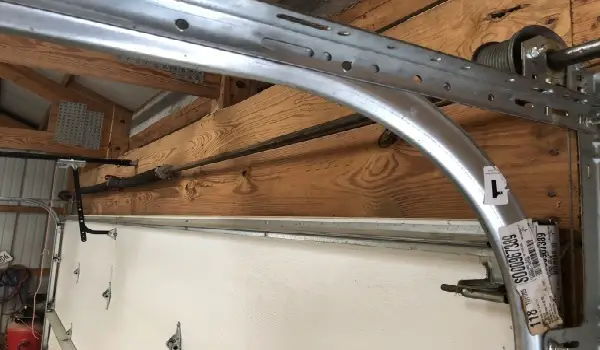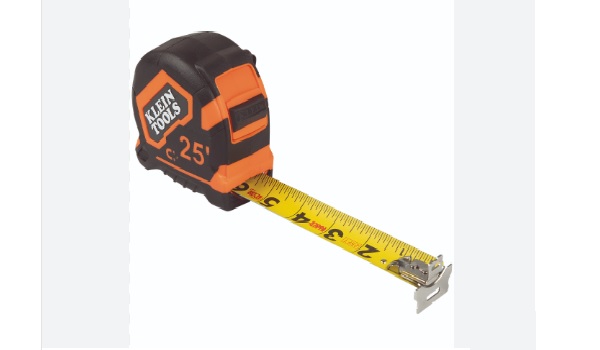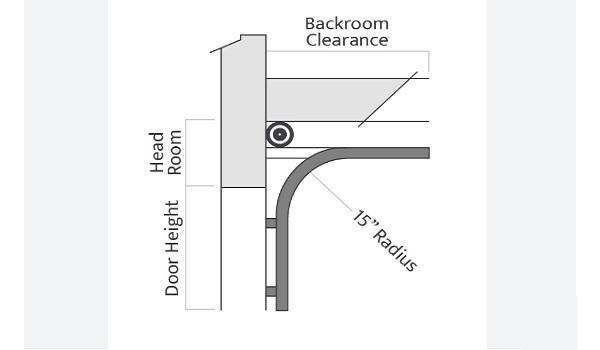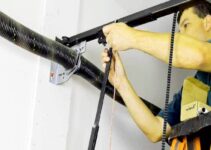As a homeowner, I’ve had my fair share of experience with garage doors. I’ve replaced them, repaired them, and even installed them myself. One of the most important things I’ve learned is how to measure the radius of the garage door track.
The radius of the track determines the curve of the track and plays a significant role in how your garage door opens and functions. If the radius is too small, the door may not open or close properly. If the radius is too large, the door may not have enough clearance to open fully.
Garage Door Track

A garage door track is a metal rail that guides the movement of a garage door. It is typically made of steel or aluminum and is installed along the top and sides of the garage opening. The track is curved to match the arc of the garage door, and it is held in place by brackets or supports.
There are two main types of garage door tracks: standard radius and 32-inch radius. Standard radius tracks are the most common type and are used for most residential garage doors. 32-inch radius tracks are used for garage doors with larger headroom requirements.
The radius of a garage door track is the distance between the center of the track and the outside edge. The radius determines the amount of curve in the track and the amount of headroom required for the garage door to open.
12 or 15 inch radius garage door track
The most common radius for a garage door track is 15 inches. This is the standard radius and is used for most residential applications. A 15-inch radius track requires 14.25 inches of headroom. A 12-inch radius track is also available, but it is not as common. This type of track requires 12 inches of headroom, which is 2.25 inches less than a 15-inch radius track. However, a 12-inch radius track can be a good option if you have limited headroom in your garage.
Here is a table that summarizes the key differences between 12-inch and 15-inch radius garage door tracks:
| Feature | 12-inch radius track | 15-inch radius track |
|---|---|---|
| Headroom required | 12 inches | 14.25 inches |
| Commonality | Less common | More common |
| Motor requirements | More demanding | Less demanding |
| Price | Less expensive | More expensive |
Ultimately, the best type of garage door track for you will depend on your specific needs and circumstances. If you have limited headroom in your garage, a 12-inch radius track may be a good option. However, if you have the space, a 15-inch radius track is the more common and recommended choice.
Here are some additional things to consider when choosing a garage door track radius:
- The size of your garage door. A larger door will require a larger radius track.
- The type of garage door opener you have. Some openers require a specific radius track.
- The budget you have. 12-inch radius tracks are typically less expensive than 15-inch radius tracks.
If you are unsure what type of garage door track radius is right for you, it is best to consult with a professional garage door installer. They can help you assess your needs and recommend the best option for garage.
Standard garage door track radius
| Track Radius | Headroom Required |
|---|---|
| 12 inches | 13 inches |
| 15 inches | 16 inches |
As you can see, the 12 inch radius track requires less headroom than the 15 inch radius track. However, the 15 inch radius track is more common because it provides a smoother opening and closing motion.
Here is a table that summarizes the key differences between the two track radii:
| Feature | 12 inch radius | 15 inch radius |
|---|---|---|
| Headroom required | 13 inches | 16 inches |
| Commonness | Less common | More common |
| Opening and closing motion | Sharper curve, opens lower | Smoother curve, opens higher |
Note: These are just the standard track radii. There are also other track radii available, such as 20 inch and 32 inch radii. these are less common and require more headroom.
Tools You’ll Need

Before measuring the radius, gather the following tools:
- Tape Measure
Step-by-Step Guide to Measure Garage Door Track Radius

Follow these simple steps to accurately measure the radius of your garage door track:
Step 1: Find the Front of the Rail
Locate the front of the rail where the garage door closes. This is the starting point for your measurement.
Step 2: Measure from the Front of the Rail to the Ground
Using a tape measure, place it on the ground and measure it right up to the bottom of the track. Take note of the measurement.
Step 3: Determining the Radius
If the measurement is 91 inches or shorter, you have a 12-inch radius. If the measurement falls between 91 and 93 inches, then you have a 15-inch radius.
Why Measuring the Radius Matters
Measuring the garage door track radius is crucial for several reasons:
- Accurate Replacement: Knowing the radius helps you choose the correct replacement parts for your garage door, ensuring it functions optimally.
- Smooth Operation: The right radius ensures that your garage door opens and closes smoothly without any hiccups.
- Safety: Proper measurements prevent potential accidents and ensure the garage door works safely.
Read Also: How to Measure Garage Door Torsion Springs
Conclusion
Measuring the radius of your garage door track is a straightforward yet critical process in maintaining and repairing your garage door.
By following the steps outlined in this guide, you can determine whether you have a 12-inch or 15-inch radius track, enabling you to make informed decisions when it comes to replacing parts or performing maintenance.
Always remember to prioritize safety and accuracy when working with garage doors.
FAQs
Can I use any tape measure to measure the radius?
Yes, any standard tape measure will work for this task.
Why is it essential to measure the radius before replacing parts?
Measuring the radius ensures that you select the right parts for your garage door, preventing potential issues and ensuring smooth operation.
Can I replace the garage door track myself?
While some DIY enthusiasts may attempt this, it’s best to seek professional assistance for precise measurements and proper installation.
How often should I measure the garage door track radius?
It’s a good idea to measure the radius whenever you perform routine maintenance on your garage door to ensure its accuracy.
Where can I find quality replacement parts for my garage door?
You can find suitable replacement parts at reputable hardware stores or through garage door specialists.
Related article


